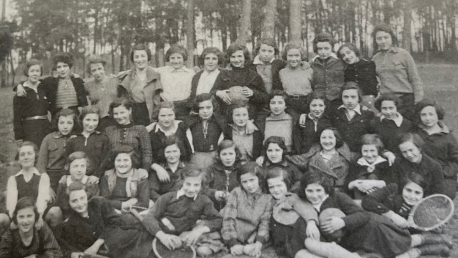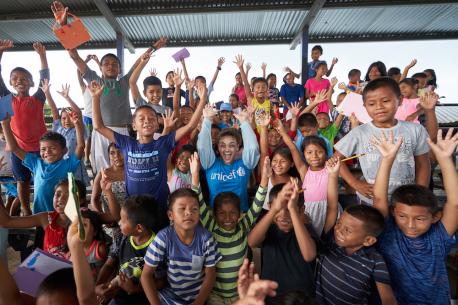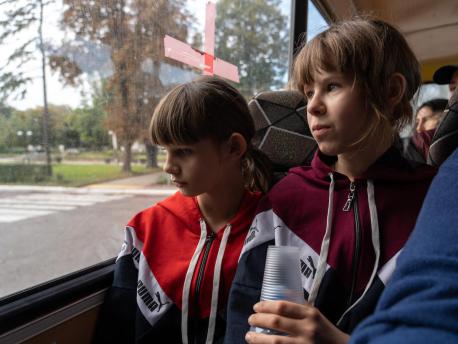
Cash Assistance Program Brings Hope to Ukrainian Families in Crisis
Flexible humanitarian cash transfers help families devastated by war in Ukraine meet their most urgent needs.
The railway station in Pokrovsk, in the Donetsk region of eastern Ukraine, is crowded but quiet. Several hundred passengers, mostly the elderly, women with children and people with disabilities are waiting for a train that will take them to a safer place.
All of them are waiting expectantly for the train to arrive, clutching bags, suitcases and their pets. Some people are crying, some are saying goodbye to relatives and others are lost in their thoughts about home and the uncertainty that lies ahead.
"The shelling intensified in our city. I was afraid for my children and their lives. So we decided to evacuate and save ourselves. But we don't even know where we are going." — Anastasia, mother of four
Anastasia tries to hold back tears, as she waits with her four children on the platform. "The shelling intensified in our city," she says. "I was afraid for my children and their lives. So we decided to evacuate and save ourselves. But we don't not even know where we are going. It's completely uncertain, but at least we will be accepted there. This train is going to Lviv, so we will look for housing there."
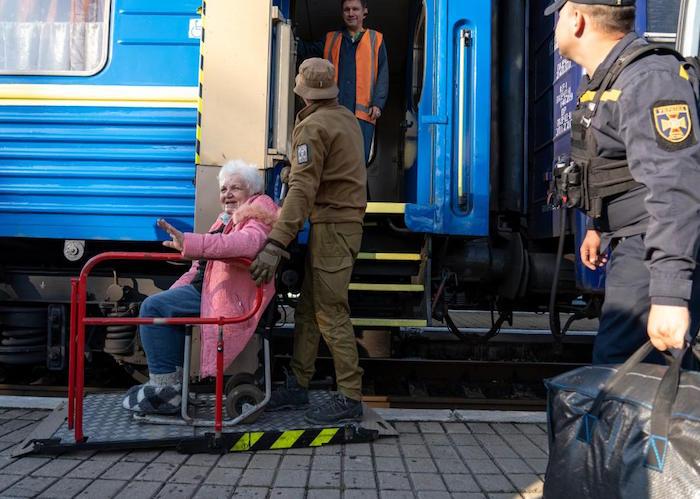
Families fleeing violence in eastern Ukraine board a free train that will take them to Lviv in the west. © UNICEF
Since Feb. 24, the free train ‘Pokrovsk-Lviv’ has carried more than 10,000 forcibly displaced people to safety. Around 300 to 400 people board each train, with the majority being families with multiple children evacuating from frontline areas.
Rescuers from the State Emergency Service of Ukraine help people from the hot spots of the Donetsk region to reach the train, picking them up on buses from cities such as Avdiivka, Toretsk and Bahmut.
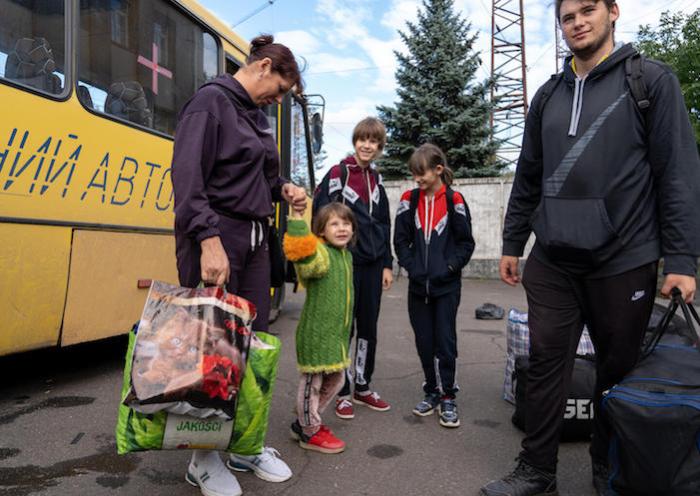
Anastasia and her four children arrived at the train station by bus, with only a backpack each. They fled their home in eastern Ukraine and hope to get settled in Lviv. © UNICEF/UN0755902/Filippov
Anastasia holds 3-year-old Milana tightly. Her other daughters, 11-year-old Polina and 10-year-old Anya, grasp the hands of their older brother, Dima. Earlier today, the family had three tasks – to clean the house, pack their suitcases and say goodbye to their pets.
"My cat, Yuzik, is fluffy and has big green eyes," Polina says sadly. "He's so cute. I'm worried about him because he can easily go to strangers. But I had to leave him because we have no idea where we were going and whether he could live with us."
"My cat Yuzik is fluffy and has big green eyes. He's so cute. I'm worried about him because he can easily go to strangers. But I had to leave him because we have no idea where we were going and whether he could live with us.” — Polina, 11
Anastasia had been postponing the decision to flee since the full-scale war broke out in February. It was not until the fragments of a missile rained down on their yard that she understood she had little choice.
"My children had been asking me to leave since the first day of the war,” she says. “But at first, I was afraid that we would be left without our home. But then I realized that the house is not that important when the lives of my children are not protected.”

Anastasia lifts her youngest child, 3-year-old Milana, onto the train in Pokrovsk. © UNICEF/UN0755903/Filippov
In their hurry, all the family packed was warm clothes and food. Each of the girls carried a small backpack and took one of their favorite toys.
"We chose this way of evacuation because the train is free,” says Anastasia. “The war has seriously affected our lives and we do not have a stable income.”
"I have never been to Lviv, but Mom says that there is no shelling in that city, so I will be able to sleep calmly there."
After boarding the train, Anya and Milana try to find seats by the windows.
"I have never been to Lviv, but Mom says that there is no shelling in that city, so I will be able to sleep calmly there," says Polina, hopefully. "The other day I fell asleep in the afternoon, and when I woke up, I could not understand whether it was day or night, whether it was today or tomorrow.”

Anastasia and her children left their home and almost everything behind, including their cat. © UNICEF/UN0755907/Filippov
For the past six months, the children have not gone anywhere alone. Since the beginning of autumn, they have been afraid to even leave the house.
"We stayed at home all day because of the missiles,” says Polina. “The other day I went outside and immediately saw a plane flying, and I got scared.”
Little Milana nods in agreement. "I got scared too and ran away," she says.
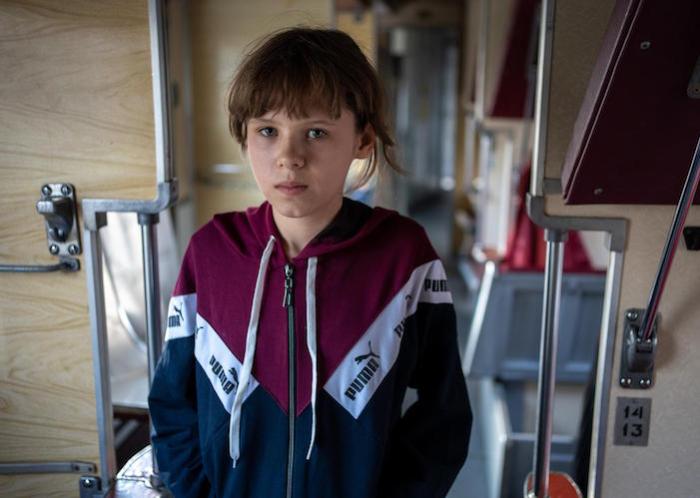
Eleven-year-old Polina and her siblings have been afraid to go outside since the beginning of autumn. © UNICEF/UN0755906/Filippov
Anastasia has applied for financial assistance from the United Nations Children's Fund (UNICEF), as part of the Spilno program. She hopes that the 30,000 UAH (approximately US $811) that she will receive as part of UNICEF assistance will help her family to pay rent and settle in Lviv.
"First, we are going to temporarily live in a shelter," she says. "Volunteers gave us its address. But we can stay there just for a few nights and then we will need to look for another place. This is a lot of money, and we don't have it. So I am looking forward to the help from UNICEF."
"First, we are going to temporarily live in a shelter. Volunteers gave us its address. But we can stay there just for a few nights and then we will need to look for another place. This is a lot of money, and we don't have it. So I am looking forward to the help from UNICEF.”
Gazing out of the window of the train as it departs, Anastasia squeezes Milana’s hand.
"I had to leave everything, my work and my house to protect my children,” she says. “The only thing left is to hope for the best.”
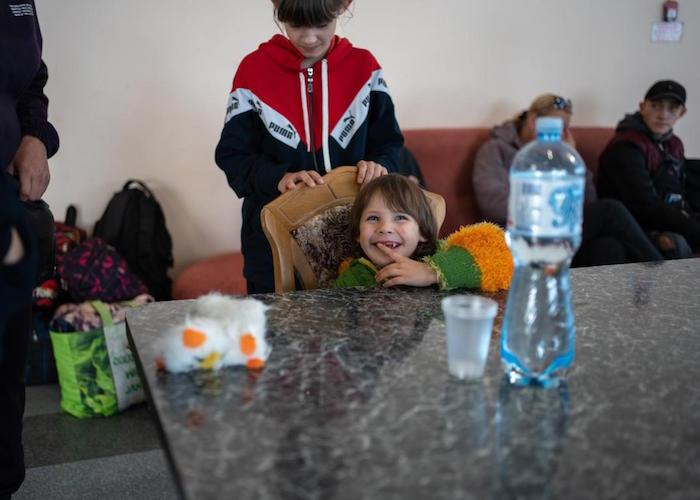
Milana, 3, brought along her favorite toy. © UNICEF/UN0755901/Filippov
As of November 2022, UNICEF has provided financial assistance to almost 200,000 families raising three or more children or a child with disabilities in Ukraine. Families spend the money received on necessities, such as clothes and food for children, medicines and rent. This assistance provides crucial support for parents while they search for a job in a new place.
Your support will help UNICEF reach more children in urgent need of assistance. Please donate today.

